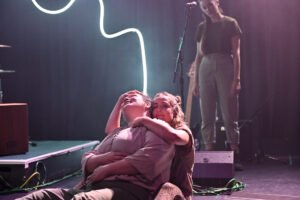It requires a careful approach. To say too much about Joy Unspeakable – a theatre piece with music that takes the words of four women, each diagnosed with an eating disorder, and makes them unignorable – is to risk diminishing its dramatic effects. Which is apt enough, since the approach that Joy Unspeakable itself takes is full of care for both its subject matter and its subjects.
Collated and shaped from first-hand accounts by Amy Hailwood, who experienced bulimia as a teenager, and informed by consultation with Dr Emily Trascianko, a research associate at the Oxford Research Centre in the Humanities, it’s an ensemble piece in the broadest sense. Given that, to emphasise any one of the four actors, each giving voice to a different young woman diagnosed distinctly across the range of disordered eating, is arguably to miss the point. In roles which are of necessity so exposing, Kate Benfield, Tasha Dowd, Rachel Hammond and Erin Rydal are uniformly excellent.
Crucially, this sense of a company extends beyond the confines of the stage itself, encompassing not only musical director Pierre Flasse and movement director Jennifer Kay, whose contributions each come vividly into their own, but the attentive lighting design of Tracey Gibbs, which skilfully evokes the neon crackle of conflicted emotions.

Copyright: Tracey Gibbs
Unfolded for this performance in The Edge’s dark pearl of a space, and divided into distinct thematic chapters, the piece cedes the spotlight to each of the characters at every stage of their relationship with food, distress and body image, standing by their sides through crisis, treatment, childhood and, ultimately, the prospect of recovery. In the process, as they echo one another in spite of their differences, commonalities emerge. The repetitive cycles of starvation, bingeing and purging find their counterparts in the rigidities of the medical model of treatment until they form the refrains of the songs that allow the cast to come together with one voice.
The unforced metaphor that gradually reveals itself in this way is that of the support group, and it seems a natural extension of this metaphor that the group itself comprises elements of punk and folk that might seem anachronistic to those in the audience long enough in the tooth to have lived through the 1980s were it not for streaming and its ‘everywhen’ effect on pop. Lyrically, Flasse’s compositions flesh out the characters’ concerns with their bodies, first in despair and ultimately in celebration. Melodically, they bring to mind the territories mapped out by the likes of The Raincoats and The Au Pairs; post-punk with a serrated sweetness. In this respect, the pivotal song, and the one that moves the first night audience to spontaneous applause, swings the scythe of sarcasm at the limitations of the medical model, sneering “mental health is not political, it’s a problem of the individual”.
Dealing as the production does with bodies both political and literal, the note of protest in its songs is complemented by the necessary physicality of its theatre. The occasional lurch into over-emphasis aside (at one point, characters actually wrestle with therapy), Kay, who also doubles as intimacy coordinator, brings sensitivity to the bridges of support the cast make of their frames.
Mindful of the trickiness of dramatising the subjective truths of others’ experiences, even in the best of faith, Joy Unspeakable chimes with verity, amplifying voices that might otherwise be dismissed, belittled or talked over. Embracing its imperfections, it quite rightly insists that it’s more than good enough.
Photos by Tracey Gibbs












